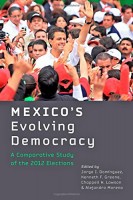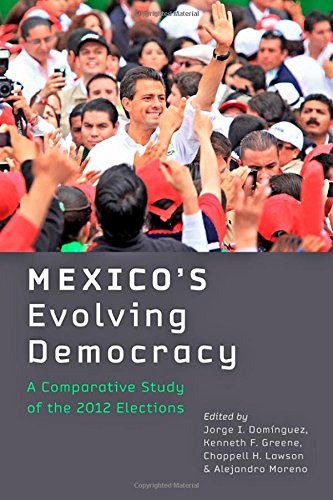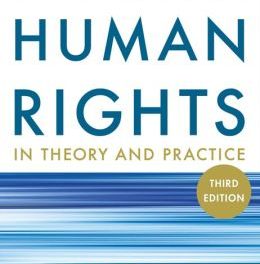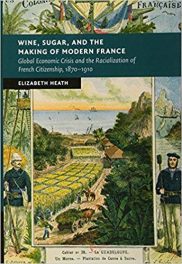 Editors: Jorge I Dominguez, Kenneth F. Greene, Chappell H. Lawson, and Alejandro Moreno
Editors: Jorge I Dominguez, Kenneth F. Greene, Chappell H. Lawson, and Alejandro Moreno
Publisher: Johns Hopkins University Press – 282 pages
Book Review by: Paiso Jamakar
The Institutional Revolutionary Party (PRI) was astonishingly returned to power in the 2012 presidential election in Mexico. It had ruled the country for more than seven decades before being ousted in 2002.
Enrique Pena Nieto was elected President with more than 19 million votes, winning in a close race over PRD’s standard bearer Andres Manuel Lopez Obrador, who obtained nearly 16 million votes. Josefina Vazquez Mota, representing PAN, placed third with an impressive 12 million+ votes.
This book assesses many aspects of the 2012 election, with comparative analyses of the 2006 and 2002 elections as well. Principally, the authors of this book, which include its four editors named above, seek fuller answers to this important question: why did this maturing democracy return to power the party associated with Mexico’s old regime?
What were the reasons for the PRI’s “rehabilitation” and eventual electoral success? To find the answers, the writers took a look at, among other factors, Mexico’s:
- Campaign strategies
- Candidates
- Electoral institutions
- Media coverage
- Public opinion surveys
And how did clientelism, corruption, drugs, new protest movements, and violence influence the 2012 election? To understand some unique phenomena and gain an overall perspective, read this eye-opening book.
Sixteen observers of Mexico, particularly its politics, have authored chapters or contributed material for this book. Most of them are in academia as professors, lecturers, senior fellows, research assistants, or PhD candidates in political science, at universities in the United States or Mexico.
The following chapters constitute the Contents of this book, which gives you an overview of what is covered in this book as well as the writers’ own observations and opinions:
- The 2012 Election in Context
- Chronicle of a Victory Foretold
- The Electoral Institutions
- Time to Turn Back the Clock?
- Public Mood and Presidential Electoral Outcomes in Mexico
- Campaign Effects in Mexico since Democratization
- Drugs, Bullets, and Ballots
- How Governmental Corruption Breeds Clientelism
- Clientelism, Declared Support, and Mexico’s 2012 Campaign
- Effects of #YoSoy132 and Social Media in Mexico’s 2012 Presidential Campaigns
- Mexico’s 2012 Presidential Election: Conclusions
Editors:
Jorge I. Dominguez is the Antonio Madero Professor for the Study of Mexico at Harvard University. He was coeditor and chapter author for Consolidating Mexico’s Democracy: The 2006 Presidential Campaign in Comparative Perspective (with C. Lawson and A. Moreno); Mexico’s Pivotal Democratic Election: Candidates, Voters, and the Presidential Campaign of 2000 (with C. Lawson); and Toward Mexico’s Democratization: Parties, Campaigns, Elections and Public Opinion (with A. Poire). He was coauthor, with James McCann, of Democratizing Mexico: Public Opinion and Electoral Choices.
Kenneth F. Greene is an associate professor of government at the University of Texas at Austin. He served as the principal investigator on the Mexico 2012 Panel Study and is author of Why Dominant Parties Lose: Mexico’s Democratization in Comparative Perspective, which in 2008 won the Best Book Award from the Comparative Democratization Section of the American Political Science Association. His articles on democratization, political parties, and voting behavior have appeared in the American Journal of Political Science, World Politics, Comparative Political Studies, and Comparative Politics.
Chappell H. Lawson is an associate professor of political science at the Massachusetts Institute of Technology. He was the principal investigator for the Mexico 1997 City Panel Study, the Mexico 2000 Panel Study, and the Mexico 2006 Panel Study. He is the author or editor of three books and author of numerous articles on Mexican subjects.
Alejandro Moreno is a professor of political science at the Instituto Tecnologico Autonomo de Mexico and director of public opinion polling at Reforma newspaper, both in Mexico City. His publications include Political Cleavages, El votante mexicano, La decision electoral, and Comportamento Eleitoral e Comunicacao Politica na America Latina (coedited with H. Telles de Souza). He is the president of the World Association for Public Opinion Research (2013-14).







